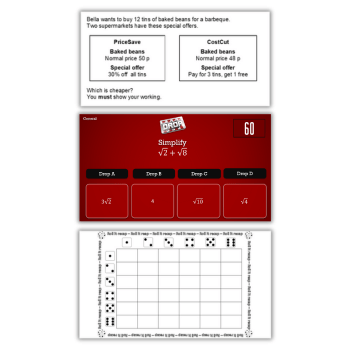Maths problem solving – Why schools should prioritise this skill

Problem-solving is a crucial, yet somehow underserved component of maths lessons – and that needs to change, says Dr Ems Lord…

- by Ems Lord

Maths teachers will be all too familiar with the three core focuses of the curriculum – fluency, reasoning and problem-solving. They might, however, find themselves struggling over that last one…
At NRICH’s many events and workshops, we’ve repeatedly heard teachers tell us that they’re struggling to consistently deliver high-quality problem-solving opportunities for their classes. Why?
Sometimes it’s because they lack the time to prioritise problem-solving within the timetable. They may worry that there’s a lack of consistency in approach across their school, or sometimes struggle to afford resources within their limited budget. Yet without problem-solving skills, students will be missing out on what makes maths so exciting for so many.
Why is problem-solving so important?
While exploring numbers can be very fulfilling, possessing amazing number skills isn’t always enough on its own. Learners must also be able to consider, choose and draw upon different strategies in order to successfully make decisions and solve problems.
Today’s workplaces demand employees who can solve non-routine problems in collaborative environments. To succeed, students will therefore need to develop resilience, be able to work collaboratively, think creatively and flexibly, and perhaps most importantly, be able to solve problems.
Collaborative problem-solving is becoming increasingly recognised as an important 21st century skill, as highlighted in the OECD’s PISA 2015 Collaborative Problem Solving assessment. That said, problem-solving doesn’t just empower students in the long term, but can also play a crucial role in helping them discover for themselves the joy of mathematics in the present day.
Imagine attending football practice, but only ever learning how to dribble. Or taking piano lessons, but only ever playing scales. Problem-solving can provide those real ‘lightbulb moments’ for students in maths lessons – it’s watching Messi score a goal, or listening to your favourite performer play live.
Problem-solving presents students with a mechanism for connecting the dots, as their maths skills and fluency in the subject become more purposeful and meaningful over time. They get to really see the value in what they’re doing, and once that value is better understood, they’ll become ever more engaged and motivated to learn.
Highlighted by Ofsted
Problem-solving is an area frequently picked up on by Ofsted, and was highlighted in the regulator’s July 2023 maths subject report. Said report called for schools to not just spend more time teaching specific problem-solving strategies, but for students to be given more opportunities to actually put those strategies into practice.
Trending
But where can schools turn to for support in implementing these recommendations, given their limited budgets and resources? One avenue is the nationwide Problem-Solving Schools programme recently launched by NRICH – part of the University of Cambridge, and one of the world’s largest maths outreach projects.
Problem-Solving Schools aims to ensure all schools are equipped to nurture students’ problem-solving skills through self-assessments of their existing provision, implementing whole-class problem-solving activities and rolling out dedicated teacher support – all provided entirely free of charge.
Problem-Solving Schools Charter
The programme begins with the Problem-Solving Schools Charter, which hundreds of schools have already signed up to. The Charter presents a framework to help you reflect on your current practice and identify areas for development, while highlighting five key areas:
- Values and ethos
- Leadership and professional development
- Curriculum, pedagogy and assessment
- Classroom culture
- Problem-solving beyond the classroom
NRICH believes that every child can become a better problem-solver, and invites readers to sign up to that ambition as part of Problem-Solving Schools.
Once you’ve reflected on your current provision and practice and identified your action points, NRICH will then provide free classroom resources and support. Our low-threshold, high ceiling activities will allow you to work through maths problems with whole classes, giving students the time and support they need to consider problems in depth, and attempt different strategies for resolving them.
We can also provide wraparound support for teachers, consisting of webinars, videos and teacher notes to help build confidence. Embark on the journey towards improving problem-solving in your setting by registering as a Problem-Solving School.
Dr Ems Lord is the Director of NRICH. current Chair of The Mathematical Association, a Fellow of The Institute of Mathematics and its Applications and a Founding Fellow of the Chartered College of Teaching. Download a maths problem-solving KS2 lesson plan from NRICH.










